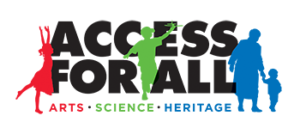 The King County Council is currently considering a proposed measure entitled Access for All, which would create game-changing access to arts, science, and heritage education and experiences for low and middle income students and families.
The King County Council is currently considering a proposed measure entitled Access for All, which would create game-changing access to arts, science, and heritage education and experiences for low and middle income students and families.
If advanced to the August ballot, King County residents would have the opportunity to vote on a .1% sales tax that would generate over $65 million per year in funding for arts, science, and heritage access and education.
Nearly $37 million of that would be divided between public school access programs and smaller, community-based arts, science, and heritage organizations – like Third Place Commons, the Shoreline LFP Arts Council, the LFP Stewardship Foundation, the Shoreline Historical Museum, and hundreds of others locally and across the county. The funds could be used for things like free and reduced price tickets, curriculum based educational programs, and other similar programs. Such funding would make a significant impact on underfunded public schools and small organizations, which could focus those resources on better programs, service, and access for their communities.
Large, regional institutions (Woodland Park Zoo, Seattle Art Museum, the Museum of Flight, etc.) would divide the rest, but those funds would represent a proportionately smaller piece of their individual, institutional budgets.
This proposal could radically increase life-changing access to arts, science, and heritage experiences for children and families living in poverty. Educational experiences of these types are too often denied to our young people and families, especially in communities of color, without the benefit of well-funded schools that provide them or the personal resources to afford such experiences outside school. This inequitable access perpetuates an achievement gap generation after generation.
For example, the National Endowment for the Arts issued a report of findings from four longitudinal studies (three from the U.S. Department of Education) showing that at-risk youth (those from the lowest quarter of socioeconomic status, or SES) consistently had better outcomes when they had meaningful arts experiences as young people. These included better academic outcomes, higher high school graduation and college attendance rates, higher career goals, and greater civic engagement both as students and as adults. (More research on powerful impacts of arts education can be found on ArtsEd Washington’s website.)
Equitable access to these types of arts, science, and heritage experiences and education for low-SES students and families is fundamental to reducing the achievement gap among at-risk youth and communities of color. And through these paths to success come further opportunities to break the cycles of poverty, homelessness, drug abuse, and other endemic challenges in underserved, low-income communities.
The future of this proposal is currently in question and the King County Council must make a decision by May 1st to put it on the ballot. If you would like to weigh in on the proposal, here are 3 things you can do today:
1. Contact your councilmembers by phone or by email and urge them to support Access for All. (Find your councilmember here.)
2. Write a letter-to-the-editor to your local news outlet about why arts, science, and heritage education is important.
3. Use your own social media. Talk to your personal networks about arts, science, and heritage education and why Access for All matters.
Want to learn more about Access for All? Visit their website or read this recent piece from The Stranger. And remember that the council will vote on this proposal next Monday, May 1st, so all feedback must be received before then.